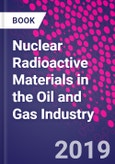Nuclear Radioactive Materials in the Oil and Gas Industry comprehensively discusses the TENORMs generated from various types of oil and gas processes and their associated adverse human health effects, effective TENORM waste management strategies, and the quantitative risk analysis. The book thoroughly investigates current knowledge, addressing the three main gaps identified in available studies: 1) Exposure to radioactivity, 2) High volume waste as a source of radiation exposure, and 3) A lack of uniform, international safety regulations.
This book offers researchers, scientists and graduate and undergraduate students a comprehensive and well-researched reference that covers fundamental concepts, problem identification and solutions development. It is an ideal, comprehensive guideline for professionals involved in the oil and gas and nuclear industries who are concerned about radiological issues.
Please Note: This is an On Demand product, delivery may take up to 11 working days after payment has been received.
Table of Contents
1. An overview of operational and occupational safety in onshore and offshore oil and gas extraction and production processes2. Fundamentals of technologically enhanced naturally occurring radioactive materials in the oil and gas industry3. Risk assessment and management of TENORM waste disposal options in the oil and gas industry4. Quantitative risk assessment and dynamic accident modeling of TENORM occupational exposure in the oil and gas industry using SMART approach5. Management of Nuclear Radioactive Materials Produced with Oil and Gas extraction and production6. The Role of International Atomic Agencies in regulating and legislation of Radiation Protection and the Management of Radioactive Waste in the Oil and Gas Industry7. The Importance of public participation in legislation of TENORM risks management in the oil and gas industry8. Conclusions and recommendations
AppendixA: Morbidity and Mortality Risk Coefficients for External ExposureB: Morbidity and Mortality Risk Coefficients for Inhalation
Authors
Khalid Alnabhani Visiting Professor, Centre for Risk, Integrity and Safety Engineering, Faculty of Engineering and Applied Science, Memorial University of Newfoundland, St. John's, Canada. Dr. Khalid Alnabhani is a visiting Professor at the Centre for Risk Integrity and Safety and Engineering, Faculty of Engineering and Applied Science, Memorial University, Canada. He holds a PhD in Engineering from Memorial University in 'Safety engineering and risk management of radioactive materials.' Alnabhani has rich and long experience in the field of Nuclear Industry and the Oil and Gas industry. Alnabhani has been recently listed as a scientist and expert in the scientists and experts' database of IAEA & AAEA. He is a member of the American Nuclear Society under the category of experts and professionals. He has a number of academic collaborations with prestigious Universities in the USA and the UK. His areas of research interest include safety engineering and risk management of technically enhanced nuclear radiological materials, the artificial intelligence role in promoting nuclear safety and security, and peaceful applications of atomic energy. Faisal Khan Mary Kay O'Connor Process Safety CenterArtie McFerrin Department of Chemical Engineering, Texas A&M University,
College Station TX 77843, USA. Faisal Khan is a Chemical Engineering Professor and Director of the Mary Kay O'Connor Process Safety Center and the Ocean Energy Safety Institute, Texas A &M University. He is the founder of the Centre for Risk Integrity and Safety Engineering (C-RISE), a Fellow of the Canadian Academy of Engineering, the Engineering Institute of Canada, and the Canadian Society of Chemical Engineering. His areas of research interest include offshore safety and risk engineering, inherent safety, risk management, and risk-based integrity assessment and management. Dr. Khan is actively involved with multinational oil and gas industries on the issue of safety and asset integrity. He also served as the Safety and Risk Advisor to the Government of Newfoundland, Canada. He continues to serve as a subject matter expert to many organizations including Lloyd's Register EMEA, SBM Modco, Intecsea, Technip, and Qatar-gas. He served as a Visiting Professor of Offshore and Marine Engineering at Australian Maritime College (AMC), University of Tasmania, Australia where he led the development of offshore safety and risk engineering group and the initiative of global engagements with many international institutions. He is the recipient of President Outstanding Research Award of 2012-13 at Memorial University, President Outstanding Research Supervision Award of 2013-14 at Memorial University, CSChE National Award on Process Safety Management of 2014, P, and Society of Petroleum Engineer award for his contribution to Health, Safety and Risk Engineering. He has authored over 500 research articles in peer-reviewed journals and conferences on safety, risk, and reliability engineering. He has authored five books on the subject area. He is the Editor of the Journal of Process Safety and Environmental Protection, Safety in Extreme Environment, and ASME Part A (Risk and Uncertainty Analysis). He regularly offers training program/workshop on safety and risk engineering in different places including St John's, Chennai, Dubai, Beijing, Aberdeen, Cape Town, Doha and Kuala Lumpur.








